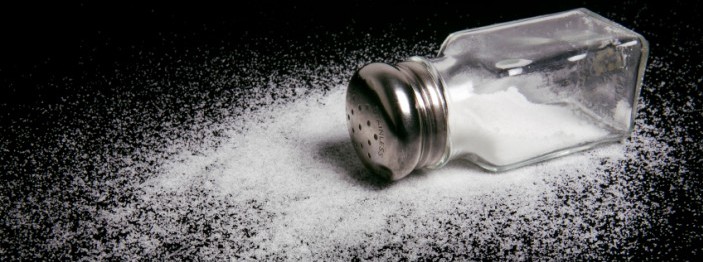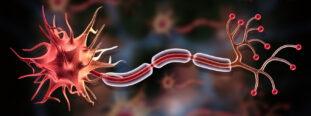ACTRIMS/ECTRIMS 2014 – Part 3
New research on diet
There is comparatively little research on the impact of diet on multiple sclerosis, but several studies did look at different aspects of this important issue. The following is a summary of some of the key studies.
Salt: A few years ago, animal studies suggested that a high-salt (sodium) diet stimulated immune cells (called Th17 cells) that promote inflammation and could worsen MS. A new study in animals has found that a high salt diet also promotes an inflammatory autoimmune response by other immune cells (called macrophages) (Hucke and colleagues. ECTRIMS 2014; abstract P598). These results were intriguing, but animal data don’t necessarily apply to people. So we’ve had to wait until now for the first study to be completed.
An observational study looked at 70 people with MS and estimated their salt intake by analysing urine samples over a two-year period; the study results were presented at ECTRIMS and published just prior to the meeting (Farez and colleagues. J Neurol Neurosurg Psychiatry 2014; epublished August 28, 2014). In comparing people with the highest versus the lowest salt intake, the researchers found that a high-salt diet was associated with a 4-fold higher risk of developing a new inflammatory lesion on the MRI. Those on a high-salt diet had an average of eight more MRI lesions, suggesting that dietary sodium can worsen inflammation in MS.
Special diets: Many fad diets are promoted to people with MS, and two studies have looked at the impact of special diets on MS. One analysed data from over 185,000 people in the Nurses’ Health studies and compared two dietary patterns: the “Western” diet, and a “prudent” diet (Rotstein and colleagues. ECTRIMS 2014; abstract PS5.3). Although people often point to the westernized diet as being a contributing factor to the increasing rate of MS, neither of these diets was associated with an increased risk of developing MS in this study. However, this doesn’t address whether a specific diet has an impact (for better or worse) in people who already have MS.
A pilot study did examine whether a low-fat, plant-based diet could help MS fatigue (Yadav and colleagues. ECTRIMS 2014; abstract P055). “Low fat” meant that less than 10% of calories were obtained from fats. The one-year study compared people on the low-fat diet compared to those keeping to their usual dietary intake. Within a month, those on the low-fat diet showed some improvements in their MS fatigue, although they cheated a little bit on their fat intake (15% of calories from fats compared to 40% in the other group). There was also a trend for those on the low-fat diet to have a little bit better mental health. But a larger study is needed to see if these differences are significant.
Obesity/fasting: There is an increasing amount of evidence to suggest that obesity during adolescence may increase a person’s risk of developing MS. A U.S. study questioned women about when they developed MS, and asked them to recall how much they weighed during the teen years (Kavak and colleagues. ECTRIMS 2014; abstract P181). Females who were overweight when they had their first period, or at age 25 years, appeared to develop MS symptoms at an earlier age than those who were normal weight. (Overweight was defined as a body-mass index of 25 [e.g. 5-foot 2 inches, 145 pounds/162 cm, 66 kg].) The average age when women developed MS symptoms was 27 years if overweight, compared to 32 years if not overweight. It hasn’t been determined yet if obesity once you have MS makes the disease process worse or not.
The reason that obesity is coming under scrutiny is that fat cells produce chemical messengers (called cytokines) that may promote inflammation. So this inflammatory state may worsen demyelination in the central nervous system. In animal models of MS, restricting calorie consumption has been shown to reduce the severity of symptoms (Cross AH. ECTRIMS 2014; abstract PS5.2). So a study is now underway to see if periodic fasting is beneficial in people with MS.
The conventional wisdom has been that fasting may worsen some MS symptoms. So thus far, two reports have looked at whether fasting during Ramadan had a negative effect on MS. A study in Iran of people with MS and mild disability found that fasting during Ramadan had no short-term impact on relapses or disability progression (Saadatnia and colleagues. Eur Neurol 2009;61:230-232). A special symposium on the topic of Islamic fasting suggested that fasting may improve the MS disease process, although hard evidence is still lacking (Jahromi and colleagues. BMC Neurol 2014;14:56). Some MS symptoms (e.g. fatigue, dizziness, spasticity, vision, balance) may worsen, but will improve once the person eats. However, fasting should be avoided if a person has significant MS disability or is taking certain medications (such as steroids, spasticity medications or epilepsy drugs).
We’ll continue our coverage of MS and diet from ECTRIMS/ACTRIMS 2014 in the next issue of MSology.
Share this article
Facebook Twitter pin it! Email
Related Posts
Back





